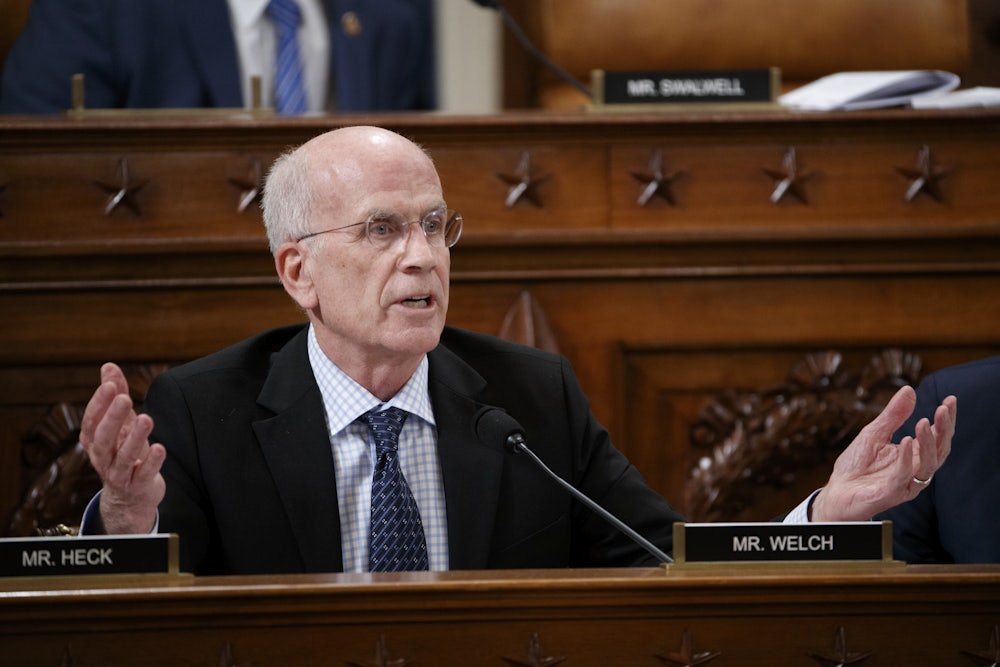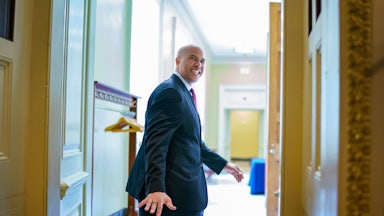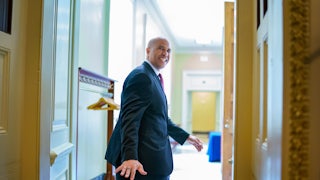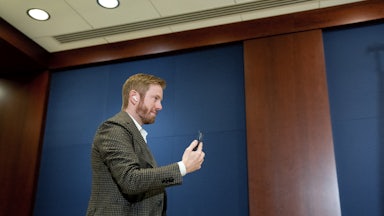Last month, Representative Peter Welch of Vermont announced that he would run to succeed Senator Patrick Leahy, after the longest-serving senator and famed Batman enthusiast announced his retirement. Welch, Vermont’s at-large representative, is considered a front-runner for the Democratic nomination in the still wide-open race and has already been endorsed by Senator Bernie Sanders.
Speaking to The New Republic, in his first campaign interview granted to a national outlet, Welch said that Senate Democrats needed to keep their majority to “maintain the Biden agenda.” To his mind, that involves focusing on issues that might boost the fortunes of working families and help to ameliorate the growing threat of climate change, and taking the steps necessary to preserve democracy—even with the filibuster looming large as an impediment to lawmaking.
At 74, Welch is only seven years younger than the 81-year-old Leahy, which means this changing of the guard would not amount to generational change in the Senate. Vermont is also the only state that has never sent a woman to Congress. But Welch said that he made his decision based on “the urgency of the moment.” “It’s an all hands on deck moment, and each of us has to make a decision about how best we can serve,” Welch said.
Welch also talked about the recent House passage of the Build Back Better Act, the necessity of building coalitions in Congress, how Vermont has handled the coronavirus pandemic, and whether his state is more purple than people may realize. (The Cook Political Report has rated Vermont’s Senate race as solidly Democratic, but the state has a popular Republican governor.)
The following conversation has been lightly edited and condensed for clarity.
You’ve framed your campaign as key to maintaining democratic control of the Senate and keeping progressive priorities on the front lines. So if Democrats do keep the majority, what do you think the party’s priorities should be?
Well, you know, frankly, we’ve got to maintain the Biden agenda. That is about having government be an active and constructive player in addressing the problems that working families face throughout the country.
Essentially, the Biden agenda is a repudiation of the Trump agenda. Biden says government can be and must be an ally in addressing major problems we face as a society. It has to play an active and constructive role in doing it. And you’re seeing it in the agenda with everything from infrastructure, which has been neglected for generations, to climate change, which has been neglected forever, and to having government focus on the needs of everyday working families.
And there’s another issue that is absolutely existential, and that is the preservation of our democracy. We have an authoritarian former president who is hell-bent on returning to power by denying and continuing to deny that he lost the last election. Anyone who doesn’t take what he’s doing seriously, and as a major threat to our democracy, is out of it. I was here in that building on January 6, when the mob invaded, when the shot was fired, when the doors were being battered down. And as bad as that was, what was even more astonishing, and sad, to me was that 147 of my colleagues voted against the person who had been elected in a free and fair election.
What we’re seeing throughout the country is, in Trump-controlled legislatures, they’re rewriting election laws to make it very difficult for people to vote, or if the legislature doesn’t like the vote of the people, make it easy for them to overturn it. So we have an epic moment here, where there’s a major question about: Will government go in the authoritarian Trumpian direction, or will it go in the FDR, LBJ, Joe Biden direction? Are we going to defend democracy or allow the authoritarian Trump wing of the country to reassert itself? So it’s an extraordinarily essential moment here. And it’s really about the direction of the country and the revitalization of our democracy. That’s what’s at stake.
And it’s essential that we maintain that seat in the Senate. Patrick Leahy, he’s not a once in a generation politician, he’s a once in our lifetime politician—48 years of extraordinarily capable, honest, and morally grounded representation. I can’t replace him, but I can succeed him. It’s really essential that we keep his progressive voice in the Senate. And it’s really essential if Democrats [are going to] maintain the majority in the Senate.
So all these priorities that you’re mentioning—climate change, protecting democracy—even if Democrats do keep the majority, it’s unlikely that you’ll have 60 seats. And it’s difficult to enact those priorities with the filibuster blocking your ability to enact change. So why do you want to join the Senate knowing that you may not be able to accomplish many of your goals due to procedural hurdles?
The question I asked myself is, what can I do? And what I can do is commit myself to do everything that my circumstances allow. In my view, the filibuster should go. But this is really an all hands on deck moment for everybody. When we make our decision, do we want to get involved or not? For me, it can’t be based on an assessment of the likelihood of success. It’s the urgency of the moment, the urgency of the challenge. It’s the urgency of what has to be done now. You can have your opinion about how well I or anybody else would do in the Senate to overcome some of these structural problems. And that’s for you to decide and you to assess. But it’s for me to decide I’m all in.
The House just passed the Build Back Better Act. Are you concerned at all about how it will be changed in the Senate?
I am. But it’s a 50–50 Senate, and we’ve got a situation there where the reality is that Joe Manchin and Kyrsten Sinema have an immense amount of influence. As does any senator—you’ve got to get 50 votes. So a lot of us on the House side are concerned about it. We did our job here and got the bill over there, and one of the incredible improvements in it was that we did include a paid family leave. As you know, Senator Manchin is opposed to that. So I deeply hope, as does Speaker Pelosi, that we are able to keep that in. But we’ll see.
You’ve spoken about the importance of building coalitions to pass legislation in the House. So how would that inform your actions if elected senator?
It informs my life. I’ve seen that listening is better than talking. And when you’re focusing on concrete problems, and talking to your colleagues about concrete problems, you can build coalitions. Like for instance, if we get a better intersection out of the infrastructure bill—parents driving their kids to school, their kids are safer. And that’s true whether they voted for Trump or they voted for Biden. You’re a parent, and you’re paying in Vermont 30 percent of your income for childcare, and with this legislation it goes down 7 percent. You might have voted for Trump, you might have voted for Biden, but now you’ve got affordable childcare. That’s a good thing.
So I approach things by talking to my colleagues about the challenges my constituents face, and oftentimes they’re identical to the challenges their constituents face. You start talking about, how do you solve that, as opposed to talking about just ideological battles, then you can make progress.
I’ll work with anybody on anything, where it’s about doing things that I think are good for Vermont. Broadband is a really good example. I was the leader of broadband in the House, started the House Rural Broadband Caucus. I come from a very rural state. Many of the representatives from the most rural parts of America are Republicans, and I asked them, “What are you doing about broadband, what are you doing about telehealth?” Their situation was the same in rural Kansas as it was in Vermont: They didn’t have it. They didn’t have high-speed internet. So when you start talking about a concrete issue that affects the people they represent, you can make progress.
So that’s my approach: build coalitions. And you have to do that just on the Democratic side. Sometimes you can do it between Democrats and Republicans, but it has to be done. It’s very much imperiled with the tribal politics that have emerged in the country. But it’s the only way to get things done.
Are you concerned about those tribal politics that you just mentioned getting in the way of any potential relationship-building or legislation that you would try to enact?
I’m worried about the tribal politics and the hyperpartisanship as a threat to the well-being of the country. You’re seeing that played out with Covid. The question of vaccines has become politicized for many. It’s not a question of what does science say, what do the medical folks say, what’s the best evidence, where you all have a common interest in stopping the spread of the virus. It’s gotten politicized. A guy like Donald Trump, that was his contribution to the health and welfare of the country, telling people to, you know, maybe drink Clorox. So that politicization of things is really bad for our ability as a country to focus on problems and solve them. I worry about that. But as a member of a legislative body, you’ve got one vote out of 100 or one vote out of 435. You’ve got unlimited time to talk and build coalitions. You can build relationships, and that mitigates some of that hyperpartisanship.
Vermont has a Republican governor; he’s the most popular governor in the country. Do you think that Vermont is more purple than people outside the state may realize?
Well, it is. I think Governor Scott is the most popular politician—he’s the most popular governor, and I think he’s the most popular politician in Vermont. He’s very popular, and he’s done an excellent job for us on Covid. But what we’ve seen in Vermont, historically, is that the governorship has gone from Republican to Democrat and back again. It’s done that every cycle for every new governor since 1962. So Vermont is a fiscally conservative, socially liberal, environmentally sensitive state. And many of the Republicans who served as governors have fit that mold.
Vermont has the highest vaccination rate in the country and one of the lowest death rates. Do you think that Vermont has lessons for the rest of the country on how to handle the pandemic?
I think Vermont took a commonsense, practical, science-based, medical-based approach. It’s a mystery to me why anyone would choose to take an approach other than that. It’s a pretty simple formula. Now, what we had was a governor and an administration that was committed to this approach. And we, I think, have a citizenry that is respectful of others, where folks want to be safe and careful to protect themselves and their families. But they feel a responsibility to do that, to take care of themselves because they know that then reduces the potential of them infecting others, their neighbors. So there’s some buy-in from the citizens. There’s been some leadership from the governor’s office and buy-in from citizens about the mutual obligation we have to one another.
Going back to the Senate race, you’re only seven years younger than Senator Leahy. Senator Sanders just turned 80. Currently, 23 members of the Senate are older than 70. Did you consider age as a factor when you decided to run? And do you think that there should be any generational change in the Senate?
It’s an all hands on deck moment, and each of us has to make a decision about how best we can serve. You know, the fact that I served in the House for 15 years, have a close relationship with my colleagues, Senator Leahy and Senator Sanders, and relationships in the House and Senate, and where the problems we face are not ones that are going to be solved by seniority, they’re going to be solved by attacking them now—I made my decision to run for the Senate. But there are many other Vermonters who are making their own decisions about how to proceed, both in and out of elective office. And I will respect the decisions they made. My hope is that all of us make decisions to be engaged, to plunge in and to do everything we can without any guarantee that we’ll be successful. But we will do it because it needs to be done.
Speaking of Senator Sanders, he’s made expanding Medicare coverage a major priority for him. Do you think that the Build Back Better Act as passed in the House goes far enough to expand Medicare coverage?
I do not. No, I agree with Bernie, having Medicare expanded to hearing and vision and dental is very important. I mean, how in the world is it that, when you have health care, it doesn’t include your head? You know: hearing, seeing, teeth. So yes, we have to do that. Whether we can, whether we have the votes, obviously we don’t yet know at this point. But I agree with Senator Sanders.
If that’s not something that’s addressed in the Build Back Better Act, is that something that you would like to see addressed in the future if you were elected?
Yes, I would.










